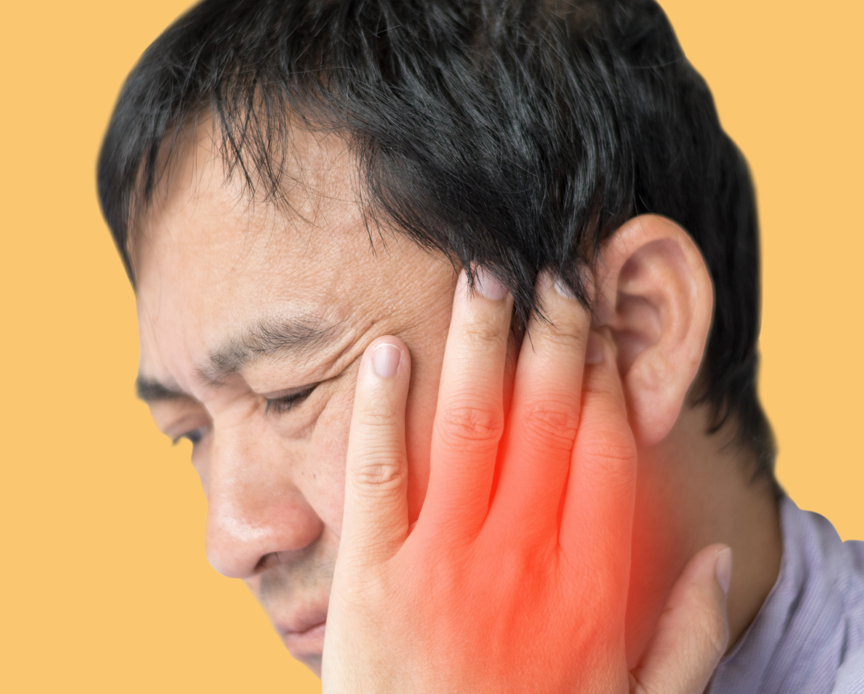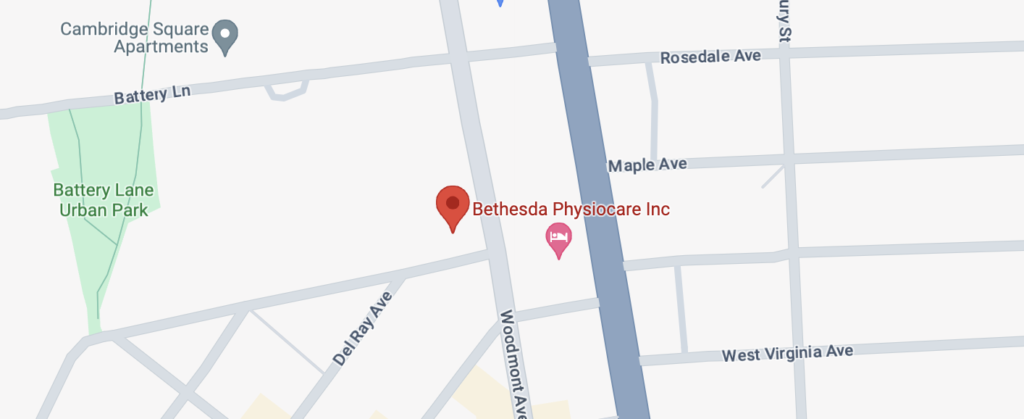
TMJ
We’ll Help Manage Your Disorder
Are you tired of dealing with consistent pain whenever you speak or eat? A Temporomandibular Joint Dysfunction (TMD) can disrupt your quality of life with 30 different disorders affecting the jaw joints. In fact, 31% of adults/elderly and 11% of children/adolescents are dealing with a temporomandibular joint disorder (TMJ/D) in their lifetime.
However, our licensed physical therapists can help you develop a plan tailored to you. Bethesda Physiocare® specializes in assisting patients with complex TMJ disorders in Bethesda who have been unresponsive to many traditional treatments.
Connect with our Bethesda physical therapist team at (301) 656-5613 to get your pain managed today.
TMJ vs TMD. What’s the Difference?
Temporomandibular Joint Dysfunction (TMD) is a condition that negatively impacts one or both Temporomandibular Joint (TMJ). When the muscles or ligaments of the TMJ are inflamed or irritated, it can contribute to TMD, which ultimately makes simple tasks such as eating or speaking difficult.
Common Symptoms
When looking for symptoms, we recognize the relationships between influences from the neck, jaw, cranial nerves, and other regions that share a common neural pathway. Because of the neural overlap in the brain, TMJ disorders can often lead to tinnitus, headaches, visual disturbances, neck pain, and even vertigo.
We can assess and treat patients with:
Jaw pain, chewing issues, difficulty opening the mouth
Headaches
Eye movement problems, pain in the eyes
Tinnitus, or sounds in the ear
Dizziness, balance problems, facial pain, facial paralysis (i.e., Bell’s Palsy)
Most of our physical therapists in Bethesda have been trained by the Cranio Facial Therapy Academy (CRAFTA®), the leading instructors and researchers in TMJ-related conditions. Through our affiliation, we are able to stay up to date on the latest TMJ discoveries and treatments to incorporate into your management plan.


How is It Diagnosed?
TMJ can be diagnosed by a patient’s primary care doctor, dentist, or physical therapist. The process typically consists of a detailed medical history and a brief examination of the head, neck, face, and jaw. Imaging such as MRI or CT scans may also be recommended to determine if there are any internal injuries. Fortunately, most cases do not require imaging and can be managed by your treating physical therapist.
However, when needed, we work with dentists, ENT specialists, jaw surgeons, neurologists, orthodontists, speech pathologists, pediatricians, etc., to fully address TMJ impairments in patients. We frequently collaborate with other professionals during your therapy to optimize healing and recovery. Often, when pain and mobility improve, your dentist will be communicated with to discuss adjusting oral appliances to accommodate for new and improved alignment.
When to Seek Treatment
If you’re experiencing consistent pain from TMJ, you should seek medical assistance. Specifically, if you are starting to notice constant pain with eating and talking. Furthermore, if you have undiagnosed facial pain and/or headaches and are suspicious, your jaw may be involved. Other symptoms that may suggest the need for physical therapy include excessive jaw popping and clicking, asymmetrical opening, or inability to contact your molars at rest (malocclusion). Everyone experiences and manages pain differently; your provider can determine an appropriate treatment plan for you.
Effective Treatments for TMJ
Fortunately, there are many options for persistent pain treatment for TMJ in Bethesda that show promising results. In fact, our founder, Dr. Jan Dommerholt, has been an invited keynote speaker at the Annual Congress of the American Academy of Orofacial Pain two years in a row. Some of these effective techniques can include:
-
- Manual Therapy: A hands-on method physical therapists use to stretch the soft tissues and muscles around the jaw joint to improve function and relieve pain.
-
- Orofacial Therapy: This chronic pain treatment focuses on exercising and stabilizing parts of the mouth and throat to normalize resting and moving positions.
-
- Trigger Point Therapy: A soft tissue treatment by inserting hair-thin needles into points of the body that are causing pain, which will then be released.
-
- Neural Mobilization: Our trained therapists can help identify and address movement restrictions of the cranial nerves. Many patients with cranial nerve impairments may experience symptoms such as burning, numbness, facial weakness, headaches, visual disturbances, and/or dizziness.
-
- Exercise: Our team for persistent pain management in Bethesda can implement light practices or stretches to help reduce pain and stress and improve movement. This can include posture stretches, neck circles, and more.
-
- Education: A physical therapist will help you understand TMJ from the inside and out to give you better resources on identifying triggers, managing pain, and more.
Contact Our Physical Therapists Today
At Bethesda Physiocare®, our primary focus is getting you the care you need when you need it. Temporomandibular Joint Dysfunction is a manageable condition that doesn’t have to negatively affect your quality of life, so speak with our experts to get the relief you need.
Schedule an evaluation today at (301) 656-5613 to start your pain treatment for TMJ in Bethesda!



